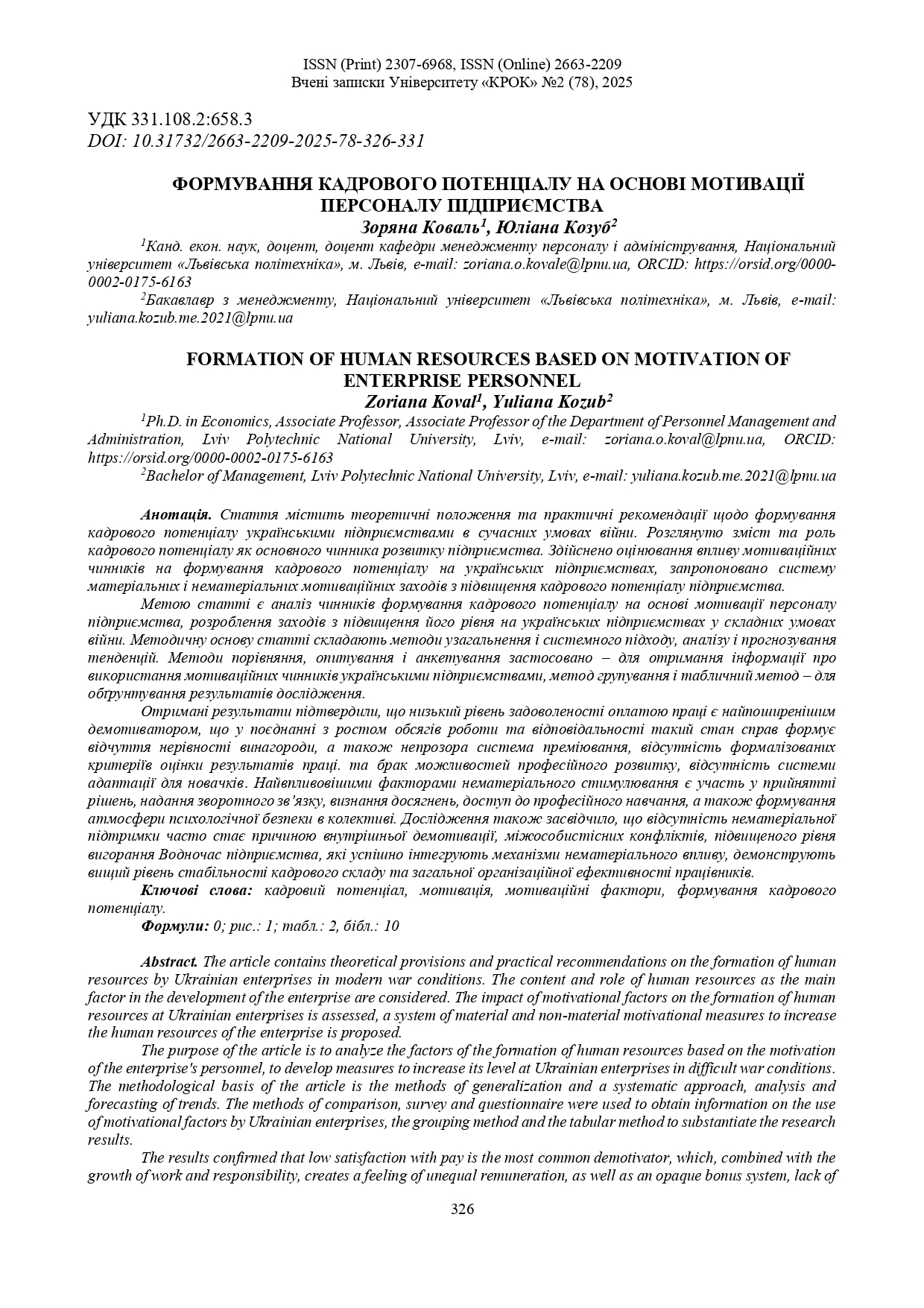ФОРМУВАННЯ КАДРОВОГО ПОТЕНЦІАЛУ НА ОСНОВІ МОТИВАЦІЇ ПЕРСОНАЛУ ПІДПРИЄМСТВА
DOI:
https://doi.org/10.31732/2663-2209-2025-78-326-331Ключові слова:
кадровий потенціал, мотивація, мотиваційні фактори, формування кадрового потенціалуАнотація
Стаття містить теоретичні положення та практичні рекомендації щодо формування кадрового потенціалу українськими підприємствами в сучасних умовах війни. Розглянуто зміст та роль кадрового потенціалу як основного чинника розвитку підприємства. Здійснено оцінювання впливу мотиваційних чинників на формування кадрового потенціалу на українських підприємствах, запропоновано систему матеріальних і нематеріальних мотиваційних заходів з підвищення кадрового потенціалу підприємства.
Метою статті є аналіз чинників формування кадрового потенціалу на основі мотивації персоналу підприємства, розроблення заходів з підвищення його рівня на українських підприємствах у складних умовах війни. Методичну основу статті складають методи узагальнення і системного підходу, аналізу і прогнозування тенденцій. Методи порівняння, опитування і анкетування застосовано – для отримання інформації про використання мотиваційних чинників українськими підприємствами, метод групування і табличний метод – для обґрунтування результатів дослідження.
Отримані результати підтвердили, що низький рівень задоволеності оплатою праці є найпоширенішим демотиватором, що у поєднанні з ростом обсягів роботи та відповідальності такий стан справ формує відчуття нерівності винагороди, а також непрозора система преміювання, відсутність формалізованих критеріїв оцінки результатів праці. та брак можливостей професійного розвитку, відсутність системи адаптації для новачків. Найвпливовішими факторами нематеріального стимулювання є участь у прийнятті рішень, надання зворотного зв’язку, визнання досягнень, доступ до професійного навчання, а також формування атмосфери психологічної безпеки в колективі. Дослідження також засвідчило, що відсутність нематеріальної підтримки часто стає причиною внутрішньої демотивації, міжособистісних конфліктів, підвищеного рівня вигорання Водночас підприємства, які успішно інтегрують механізми нематеріального впливу, демонструють вищий рівень стабільності кадрового складу та загальної організаційної ефективності працівників.
Завантаження
Посилання
Furman D., Shatalova L., Usatenko O., Bataiev S., & Chychun V. (2024). Current trends in labor potential management: the role and impact of technologies and changes in the working business environment Journal of Interdisciplinary Research. 2024. № 1. 28–33. DOI: 10.33543/1401392833.
Штерма Т., Дубина М., Соловій А. Формування трудового потенціалу: теоретичні аспекти. Formation of labor potential: theoretical aspects. 2024. 263–282. URL: https://doi.org/10.30525/978-9934-26-378-1-10.
Hajiali, I., Fara Kessi, A. M., Budiandriani, B., Prihatin, E., & Sufri, M. M. Determination of Work Motivation, Leadership Style, Employee Competence on Job Satisfaction and Employee Performance. Golden Ratio of Human Resource Management. 2022. 2(1), 57–69. https://doi.org/10.52970/grhrm.v2i1.160
Aleksić, M. M., Jerotijević, G., & Jerotijević, Z. (2019). Modern approaches to employee motivation.Ekonomika, 65(2), 121–133. https://doi.org/10.5937/ekonomika1902121A.
Wang N., Luan Y., & Ma R. (2024). Detecting causal relationships between work motivation and job performance: a meta-analytic review of cross-lagged studies. Humanities and Social Sciences Communications. Vol. 11. Article number: 595. URL: https://www.nature.com/articles/s41599-024-03038-w.
Белопольський М. Г., Хаджинова О. В., Бессонова А. В. Теоретико-методологічні засади системи управління кадровим потенціалом. Economics Bulletin. 2022. № 4. С. 72–79.
Bilderback S. L. & Miller G. J. (2023). Importance of employee development programs in business. Journal of Management Development, vol. 42, no. 4, pp. 327–336. doi: 10.1108/JMD-03-2022-0054.
Шаповал О. Сутність кадрового потенціалу та його роль у забезпеченні фінансової стабільності. Таврійський науковий вісник. Серія: Економіка, (15), 231-236. 2013. doi.org/10.32782/2708-0366/2023.15.28.
Галицька У. Б. Формування та ефективність використання кадрового потенціалу. URL: https://www.pdau.edu.ua/sites/default/files/nppdaa/6.1/72.pdf (дата звернення: 16.11.2024).
Коваль З.О., Мандибур А.А. Аналіз можливостей інтегрування міжнародного досвіду мотивування персоналу в систему управління українських підприємств. Економічний простір. 2024. № 195. С. 72–76. DOI: https://doi.org/10.30838/EP.195.172-176.

Downloads
Опубліковано
Як цитувати
Номер
Розділ
Ліцензія

Ця робота ліцензується відповідно до Creative Commons Attribution-NonCommercial 4.0 International License.

